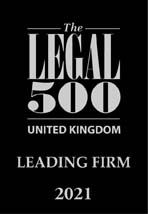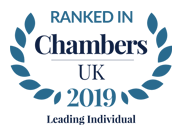Wasted Costs Orders
Attempting to “defend the indefensible” is always an unenviable position to be in, and, in the case of solicitor’s firm, Rainer Hughes, can be a costly one.
Mrs Karadag, the Claimant in the original action and Second Respondent in the present action, initially instructed Bond Turner Solicitors in respect of a personal injury claim stemming from an (alleged) road traffic accident who issued proceedings on her behalf. A further personal injury claim by Ms Ilieva, the Claimant's daughter in law, and third respondent in the present action, was settled without the need for proceedings. The Defendant, and first respondent in the present action, Liverpool Victoria Insurance Company (“LV”), initially accepted liability.
As part of her claim for damages, Mrs Karadag attended a medical appointment, with her daughter-in-law acting as a translator, to have her injuries assessed. She also later went on to sign a witness statement which gave her evidence regarding the claim for damages. This statement was drafted, and signed, in Turkish with an English translation.
A trial for quantum only was listed for April 2020 but had to be vacated due to the Covid-19 pandemic. Instead, on 1 April 2020, LV applied to the Court for permission to resile from their admission of liability and to plead fraud and bring a counterclaim in the tort of deceit against Mrs Karadag and Ms Ilieva.
While waiting for the application to be decided, Mrs Karadag changed solicitors and instructed the appellant in the present case, Rainer Hughes.
The application was granted in October 2020 and a defence to the fraud claim was drafted by counsel in English, with a statement of truth signed in English. Rainer Hughes subsequently filed and served the defence.
The file handler at Rainer Hughes, Mr Jason Borg, left the firm in November 2021. However, during his time with conduct of the file, Mr Borg oversaw the drafting and signing – in English – of a second witness statement which included a number of references:
“10. I kept my communication with the driver of the grey Ford to an absolute minimum as I am not very good at communicating in English under extreme stress and I therefore had to rely on my daughter-in-law to handle the situation and communicate with the third-party driver.”
“23. …the agent arrived with the vehicle at a time when my daughter-in-law was not around to go through all of the paperwork for me before I could sign.”
It is also worth noting that the main point of contact throughout the proceedings for Mrs Karadag was her daughter-in-law who would apparently visit and explain the relevant documents to her.
The file eventually ended up with Mr David Inksip, who duly filed the pre-trial questionnaire and in doing so indicated that Mrs Karadag would need a translator for the trial. The pre-trial review took place before HHJ Lethem who, upon considering the questionnaire issued an order in the following terms:
“The Defendants' solicitors shall take instructions, and then clarify in writing (to be relied upon at trial) that the Claimant's witness statements comply with CPR 32 and whether the various Statements of Truth that she has verified comply with CPR 22. They should also indicate the level of the Claimant's grasp of English.”
Mr Inskip apparently confirmed with Mrs Karadag’s daughter-in-law that Mrs Karadag did understand the contents of her statements. He then wrote to the Court to advise that “Mrs Karadag's level of English is proficient, and she is able to understand and assist in the drafting of the court pleadings.” Going further to state that a translator was needed “for the purposes of a trial cross-examination” to ensure no delay.
On the day of the trial HHJ Monty KC had two issues to deal with. The first being to decide whether Mrs Karadag should have relief from sanctions in relation to the non-payment of the trial fee, for which no proper explanation was given. The second, and more pertinent issue, was raised by Mrs Karadag’s counsel who informed HHJ Monty that Mrs Karadag was unable to properly read her witness statement, or the pleadings, which were in English, as she was only proficient in Turkish. Mrs Karadag had attended Court that morning with a Turkish interpreter to assist her in giving evidence. Both of these issues were sufficient to persuade HHJ Monty that the claim should be struck out, as well as the Defence to the Counterclaim.
LV requested that, because of the translation issues, the Judge make an order that Rainer Hughes show cause why they should not be held jointly liable for the wasted costs which were ordered.
Pursuant to HHJ Monty’s order Mr Sanjay Panesar, senior partner at Rainer Hughes, prepared and filed a witness statement. Attached to this statement was a bundle of documents which he claimed contained “all documents and correspondence from instruction to date.” This statement made a number of assertions of Mrs Karadag’s proficiency in English and claimed that the interpreter for the trial was “to assist with the stresses of the trial as Mrs Karadag is elderly and has medical issues.”
In response a witness statement was filed and served by Ms Sacha May of Keoghs Solicitors, instructed by LV, which amongst other things highlighted an email exchange with Mr Borg in late 2020 where it was queried why the reply to the defence was in English despite the assertion being made that Mrs Karadag is Turkish and her statement required translation. To which, Mr Borg replied –
"[I]ndeed, this might have been intimated previously, but due to time constraints, we were unable to source our client's statement in Turkish in the first instance. We are aiming to obtain such and will have better opportunity to do this if a stay is agreed".
Ms May continued her point by submitting –
"It is therefore clear at an early stage that Rainer Hughes were aware that Mrs Karadag required translation assistance, that such translation was not required as a form of an assistance and such translation should have been filed with the witness statement and in accordance with the court's deadline. As Mr Panesar has advised that they were aware that the statement required translation and is therefore contradictory to Mr Panesar's further submissions that Rainer Hughes have ensured compliance with the Civil Procedure Rules. It is important to note that the witness statement of the Claimant was served on 5 November 2021 approximately 11 months post the email from Mr Borg on 21 November 2020, 12 months prior to the pre-trial review hearing and 13 months prior to the trial. Rainer Hughes therefore had ample time to ensure that the relevant steps, translations and applications were undertaken/commenced prior to the hearing".
Upon considering the submissions, a suitably unimpressed Judge Monty delivered his judgement stating that-
“80. … There was a proliferation of red flags here which should have led Rainer Hughes to realise that without properly translated statements, this was a disaster waiting to happen.
81. I have no doubt that their failure to have done so was negligent in the sense identified in Ridehalgh, and that it was also a breach of the firm's duty to the court … Rainer Hughes' negligence seems to me to have been a breach of the duty on a legal representative to assist the court in promoting the over-riding objective.”
Turning to the quantum of the wasted costs, Judge Monty summarily assessed the wasted costs as a result of the translation issues to be £3000. He also made further awards in respect of the wasted costs application, LV as First Respondent was awarded costs of £9,500 on an indemnity basis (though this is less than the £15,000 they had claimed because the Judge penalized them for the late filing of their Statement of Costs), and £4,000 each for the Second and Third Respondents, Mrs Karadag and Ms Ilieva, who had been forced to obtain independent representation as a result of Rainer Hughes actions.
Rainer Hughes sought permission to appeal, which Judge Monty had initially refused, in order to challenge the costs that they had been ordered to pay. Dismissing the appeal, Justice Martin Spencer went as far as to brand two of the grounds – that the second and third respondents should not have been awarded their costs for the wasted costs hearing – as “hopeless”, noting that it was Rainer Hughes themselves which advised them to seek alternative representation, and Mrs Karadag had a vested interest in the outcome of the application as it would affect the costs she would be required to pay stemming from the dismissal of her claim.
Similarly, they sought to criticize the decision to award the costs on an indemnity basis, arguing that Judge Monty placed too much reliance on Rainer Hughes negligence in determining this point. Justice Spencer dismissed this point, highlighting that the approach of the solicitors, Rainer Hughes, to the application was more than sufficient to justify the awarding of costs on an indemnity basis, firmly endorsing Judge Monty’s’ finding that - "I have no doubt that the negligence of Rainer Hughes together with their stance on this application which I would define as an attempt to defend the indefensible, took this out of the norm and that I should assess the costs on an indemnity basis.”
There are two cautionary tales intertwined in this matter. The first being that particular care needs to be taken when preparing witness evidence and drafting pleadings for a party that is not suitably proficient in English. The Civil Procedure Rules, and their Practice Directions, are clear that a witness statement must be in the witness’s own words and in their own language and where that language is not English a translation must be provided.
The second cautionary tale is that where a mistake has been made, as was evident in this case, attempting to defend and justify the mistake will only make matters worse. Had Rainer Hughes accepted the mistakes made with good grace, the costs awarded would likely have been far lower – particularly as there would have been no need for a hearing on the wasted costs application. Instead, Rainer Hughes forced a hearing and attempted to justify, without evidence, that Mrs Kadang was indeed proficient in English, despite all of the evidence to the contrary.







